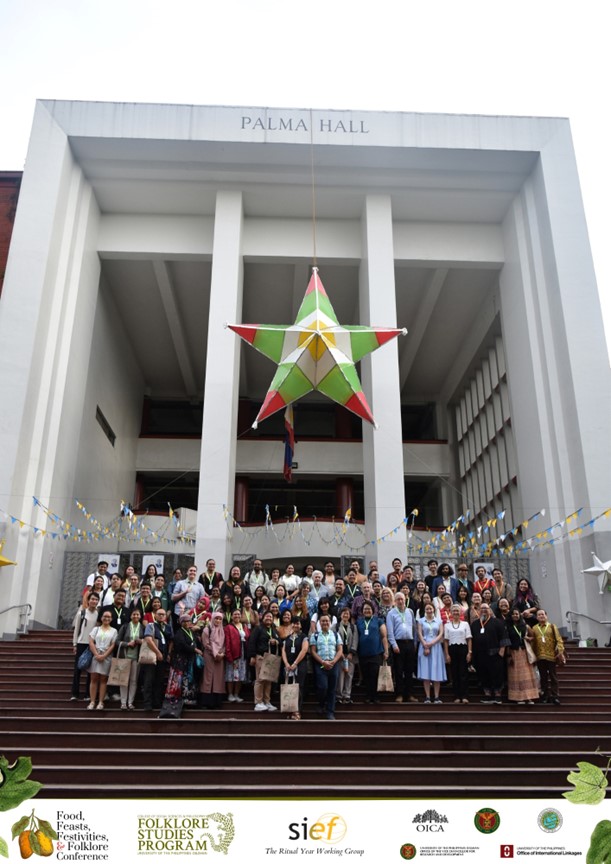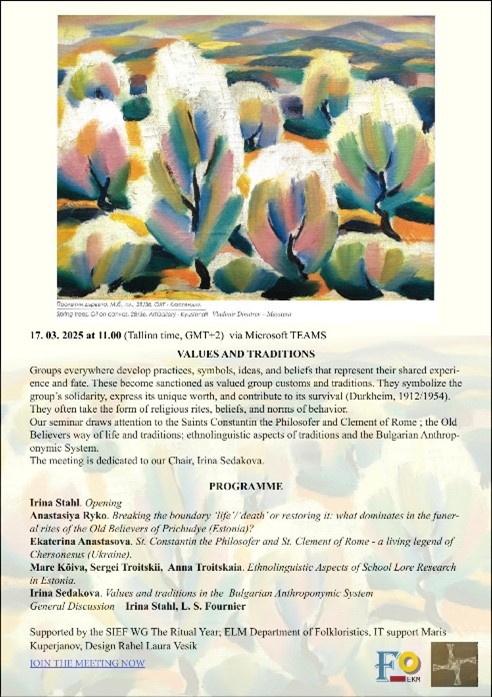
The Ritual Year Working Group
The WG reports on its 14th seasonal webinar on “Values and Traditions”, on March 17th, 2025 as well as its 15th conference on “Food, feasts, festivities and folklore”, held in Manila, Philippines on December 11th - 13th, 2024.
The Ritual Year seasonal webinar continues
 The 14th Ritual Year seasonal webinar (17 March 2025)
The 14th Ritual Year seasonal webinar (17 March 2025)
The first RY seasonal webinar of the year took place on the 17th of March. Addressing the general theme of “Values and Traditions”, the webinar was dedicated to Irina Sedakova, who recently celebrated her 70th anniversary. Head of the Department of Typology and Comparative Linguistics and of the ”Balcanica” Centre, Institute of Slavic Studies, Russian Academy of Sciences and professor at the Russian State University of Humanities in Moscow, Irina is one of the founding members of our WG. Secretary of the RY WG, since its creation, in 2004, she later replaced Emily Lyle, our founder, becoming the WG’s Chair, in 2014. A philologist, specialist in the field of ethnolinguistics and folklore, Irina has been the initiator of many of our activities, including the seasonal webinars’ series.
The RY Spring 2025 seasonal webinar included talks about the funeral rituals of Old Believers in Estonia (Anastasiya Ryko), about the worship of saints Constantin (Cyril) the Philosopher and Clement of Rome in Chersonesus (today Kherson, Ukraine) (Ekaterina Anastasova), and ethnolinguistic aspects of the school lore research tradition in Estonia (Mare Kõiva, Sergei Troitskii and Anna Troitskaia). Irina Sedakova closed the meeting with a speech on one of her main research topics: the Bulgarian anthroponomic system. The meeting was moderated by Irina Stahl and Mare Kõiva.
Irina Stahl
The Ritual Year Working Group 2024 conference in Manila
In 2018, at the 13th Ritual Year WG conference in Bucharest, two attendees from the Philippines: Maria Bernadette Abrera (Bernadette) and Honey Libertine Achanzar-Labor (Levy), travelled over 9000 km to join us. Six years, a pandemic and two wars later, in December 2024, it was our turn to make the long journey to the Philippines, were our biennial WG conference was hosted by the Folklore Studies Program from the University of the Philippines (UP) Diliman, in Quezon (about 10 km NE of Manila). For those of us who made it in person, this was an unforgettable experience.
The 15th RY conference, Food, feasts, festivities and folklore, took place between the 11th and the 13th of December 2024, at the end of the wet season in SE Asia. While at this time of the year, the heat was manageable, the humidity was a bit more challenging. In fact, one of the first lessons we quickly learned, was how climate determine human interactions, and that the usual continental hugs & kisses greetings are not recommended in the Philippines!
Since our first meetings, the RY WG conferences have always provided us with opportunities to learn about the hosting country’s culture and traditions. Our Filipino conference continued this tradition, giving us many new experiences and insights. In the lush tropical surroundings of the UP campus, Jesus Federico Hernandez (Tuting) and his team of helpers, put together an outstanding event! During the three-day conference, 97 delegates from all the corners of the world - from the United States and Canada, to Norway, France, Germany, Lithuania, Romania and Bulgaria, and further East to India, Bangladesh, the Philippines, Malaysia, Indonesia, China, Hong Kong and Japan – exchanged ideas and fieldwork findings on the one topic that has always brought people together: food. The young organizing committee excelled in their task. From the live instrumental and dance performances of the student ensembles, to the beautiful conference posters, tobags and nametags, everything showed great creativity and talent, as well as care and consideration towards the participants. The conference was opened by Ruth R. Lusterio-Rico, the Dean of the UP Diliman College of Social Sciences and Philosophy, who addressed the welcome speech. She was followed by Martin F. Manalansan IV (Rutgers University – New Brunswick), the invited keynote lecturer, who gave a talk on the Filipino Cuisines: Cooking National Fictions & Diasporic Aspirations. The first day continued with tree plenary sessions given by Ige Ramos (Ugnayan Center for Filipino Gastronomy), Maria Bernadette L. Abrera (UP Diliman) and Hanafi Hussin (Universiti Malaya). The conference program, during the next couple of days, included 32 panels, with three paper presentations each, in addition to five interesting food demonstrations. Although most of the attendees presented in person, the organizers also accommodated those who chose to attend remotely. The diversity of topics, theoretical and methodological approaches, the rich fieldwork experiences and the colonial insights occasioned instructive exchanges, all carried out in the best SIEF cultures in dialogue tradition. The natural serenity outside the panel rooms contrasted with the human awareness inside: while the birds were singing, the flowers were blooming and the campus cats were playing with their recent catch, the scholars were debating.
The last day of the conference ended with a special WG dinner, in which we served some of the food we had recently learned about. In transgression to the ongoing Christian Lent, we complied with local traditions and tried the lechon, the roasted piglet, which could best be described as memorable! On Saturday, together with the organizing team, we went on a trip to Paete (Laguna province), where we visited the 17th century old Catholic church of Saint James the Apostle and saw some amazing religious colonial paintings, and took part in several fascinating carving (in ice, wood and fruits) and papier maché (taká) demonstrations, carried out by local artists. We had the opportunity to talk to them and learned about their struggle to keep alive the old carving traditions, endangered due to extensive deforestation. Under refreshing on-and-off rain showers, walking around the town, we could only admire the ingenuity and inherent artistic talent of the locals, able to recycle and turn pretty much anything into a masterpiece.
The 2024 Ritual Year WG conference was not one of our ordinarily gathering. Taking our WG to SE Asia sadly meant many of our regular, European based members could not join us in this endeavor. Nevertheless, it allowed us to explore new horizons and established new connections with colleagues who share our belief in open communication and mutual understanding through science.
Irina Stahl





